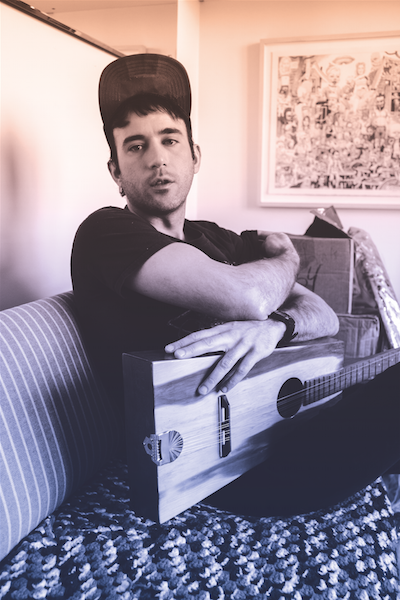Sufjan Stevens is My Own Lo-Fi Jesus
A version of this article originally appeared on Noted.
‘Prone to leave the God I love.’
Words Robert Robinson wrote in ‘Come Thou Fount of Every Blessing’ more than 250 years ago, part of a pitiful, darling prayer that has been in my head from the day I heard it, and has complemented so many bright mornings and dark nights that it has become rote. The lyrics of ‘Come Thou’ come to me, an unbeliever of sorts, at my most wretched and boisterous moments.
I’d never have heard them if it weren’t for my current Voice of God, whose own petitions to Him are gorgeous confessions that we may not hear the like of for years, and whose music has done more for a suffering modern spirit than any confession: Sufjan Stevens.

Sufjan Stevens plays Academy of Music April 9th and 10th.
2011. Not a good time for yours truly, not a great time for Catholic mass. I have gained 20 pounds, and I am lodged in the purgatory of community college: absolution for the sin of underachievement. Nothing is going right for me, and on top of it, Sunday mass is now differently said, significantly so. The melody is gone, the rhythm has been hacked up, and the one ritual that I have memorized sounds miserably foreign. Every mass that I attend leaves me feeling like an actor flubbing on stage.
I listen to Stevens almost every night. It’s not a fanboyish obsession, or a passing phase. It is something indelible and unshakeable, and I know my enjoyment of it sometimes annoys my friends. Most tracks off Greetings From Michigan aren’t road-trip music. They are intensely personal windows into Stevens’s mind, addled as it is by the fear of eternity and a pastoral sense of responsibility to his Midwest homeland. They are also introspective to the point of wussiness, meditative enough to cause personal agony and cosmically contemplative, able to coax fleeting feelings of religious horror out of almost any listener. Sweet tendrils of those songs cling to me: I, too, live in the post-Catholic, post-Vatican 2.5 fear of what comes next, and with an inexorable sense of devotion to my home, the Hudson Valley, and the worry that any effort I make to make something of myself is inutile in the mind of God.
The Ratzenberger regime has made a change that has pushed me into the waiting arms of a post-spiritual, disconcertingly Christian, doe-eyed, MFA-beset Illinoisian multi-instrumentalist whose songs—psalms, really—could easily be sung in my native St. Christopher’s tomorrow.
What a world. Every day I drive to a community college that smells like a gigantic breakfast sandwich, scared for my future, listening to my very own prophet.
2009. Something is wrong with me.
Lots of things are wrong with me.
My aunt passes; my grades fall; my mother tries to wheedle me into special ed; my lacrosse coach judges, ultimately, that I am not the salvation project that he once projected me as. I’m gripped by a teenage loathing, accentuated by a particularly wet and morose spring. I’m dealing with my first of many bouts with the abject fear that comes with being a conscious, logical, and far-too-emotional person in the 21st century. This is the year in which I punch my first bare-fisted hole in sheetrock, and the first year that I grudgingly “play bass” in a band, and the year during which I’ve felt the most alone so far. There is a lonesomeness, a lack of identity, and my first foray into that kind of teenaged, blackhearted atheism, played off with a smile.
We’re all prone to leave the God we love.
All there is is shame, and rain, and the sounds of Stevens, my own lo-fi Jesus, when I’m on the bus to a game, or on my way home, or sitting up in my bed at one in the morning, crying because I’ve broken my life and no one expects me to fix it. The music is the frothing ambience pulsating around my darkest days. The music is the oil of cloves to me, the infected tooth.
My song for the elucidation of the Mysteries, a song of submission.
My nouveau Song of Solomon.
My song of eschatology and innate dread of eternity.
My song of brotherhood.
https://www.youtube.com/watch?v=GGo7RMvBmvw
Hymns, all.
They remind me that pain is universal, that suffering is part of the human experience, that there is beauty everywhere, that worse shit happens to better people than me, and that I just need to suck it up. And that if there is a God, he speaks from unexpected places and people—through dollar-store earbuds and the tinny warble of old Sony stereos.
2007. We get Spin magazine as part of signing up for the rewards program at Best Buy. I’m the only one in the house who reads it; my dad thinks it’s a little too new-fashioned and Klosterman-y for his tastes. I take the suggestions Spin gives me to heart, for some stupid reason, and as a result have loaded my iPod knockoff with artists like Lavender Diamond, Polyphonic Spree, and the Flaming Lips. In one issue, there is a photo of an unbearable looking dweeb wearing angel wings, grasping a banjo and looking like he’s holding a note that will in short order cause him to cough up blood.
Seems right up my alley.
2015. I live in Union City, New Jersey, and hustle out of my apartment at 6 in the morning to a very anonymous job at an unstoppable news conglomerate. Union City is one of the most densely populated cities in the United States, primarily Hispanic families and immigrants, and as such there are plenty of places of worship, from the church down the street to the Pentecostal, storefront ministry that I jog past every other day on my way to 48th Street. A part of me—the Catholic part—thinks I should stop in, and pay tribute to He Who Might Be There and the faith of my ancestors.
And maybe I will again someday. Thanks to Sufjan, I never suffered the lapse that’s supposed to affect every one of us papists. The tether never snapped. Through his songs, I’ve learned to appreciate the infinite worry of humankind, and our search for totems that only bring us closer to it. I’ve learned that faith doesn’t lie in dogma or doctrine, but in the contemplation of the beauty around us and appreciation of a universe that allows us to live and love and fear God, but ultimately doesn’t give a damn. I’ve learned that faith—especially that syncretic, amazing faith of Sufjan Stevens, or at least the one he pretends to have—can be expressed fully through song.
They remind me that there is something there, terrible and beautiful. Something unlikely and invisible, and easily, it seems, actualized in songs about the holy terror of being left alone at a video store when you’re a little kid, or contemplations on American drifting.
But in my ears on those jogs past the ministry, and when I rise in the morning and amble toward New York, are the hymns that have followed me from my youth, more constantly than any ‘Dias Irae’ or ‘Excelsis Deo.’
The God I love will be fine on his own for now. I have one of His to remind me of Him from time to time.
Carrie and Lowell is out. Hallelujah.
Sufjan Stevens plays in Philadelphia tonight and tomorrow at the Academy of Music. More information here.
Follow @QuinnOCallaghan


